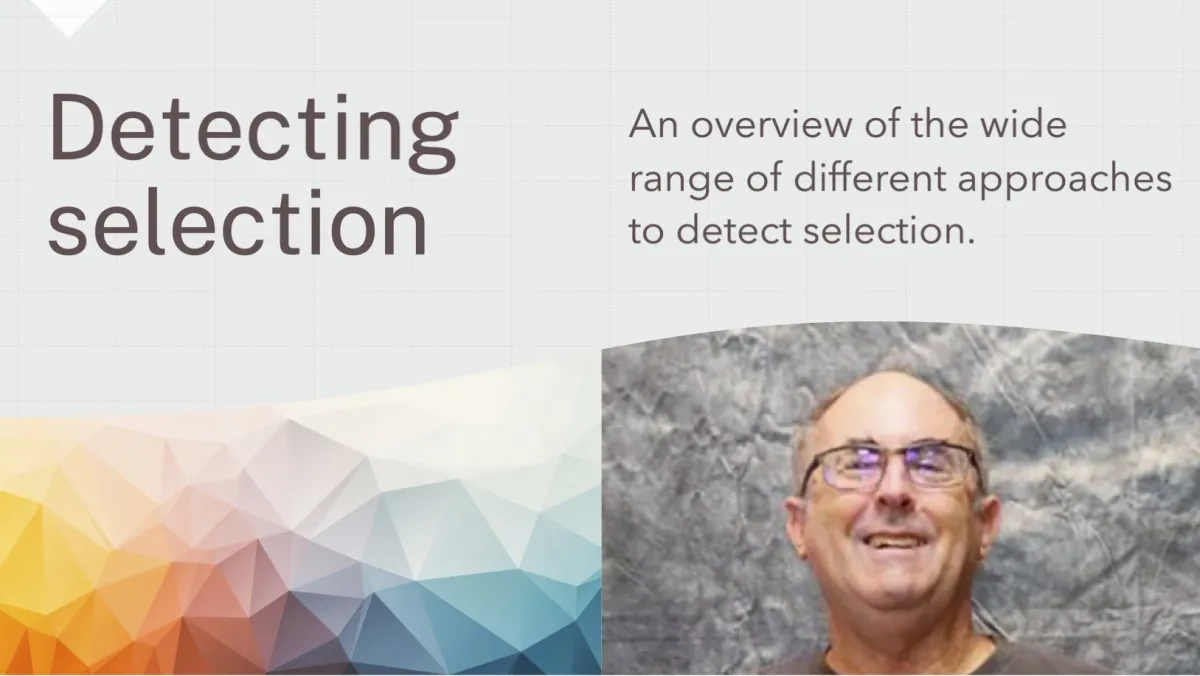Detecting selection
This one-day workshop presented by Bruce Walsh from the University of Arizona will provide an overview of the wide array of approaches have been proposed to detect selection.
Speakers
Event series
Content navigation
RegisterDescription

A very wide array of approaches, and their associated statistical tests, have been proposed to detect selection, ranging over time scales of ongoing (or very recent) selection to long-term evolutionary trends over tens of millions of years. Tools range from random-walk methods over a stratigraphic sample of the fossil record, to tests of the nature of selection acting on gene expression level over time, and finally to strategies of estimating fitness based on ecological studies and assigning specific traits as the targets of selection.
This one day in-person workshop will give a brief overview of a wide range of these different approaches (based on Chapters 2, 4, 8-10, 12, and 29-30 of Walsh and Lynch, Evolution and Selection of Quantitative Traits). These will be broken into four 90-minute sessions:
|
9:00am |
Trait-specific approaches (random-walk tests of trait change over time; marker-informed approaches: QTS/PST vs FST, QTL and GWAS-based tests |
|
10:30am |
Morning tea break |
|
11:00am |
Trait-independent marker scans to search for regions of a genome involved in adaptation. I. Recent/ongoing selection using polymorphism data (scans for sweeps, Tajima family of tests, long haplotypes) |
|
12:30pm |
Lunch break |
|
1:30pm |
Trait-independent marker scans to search for regions of a genome involved in adaptation. II. Long-term repeated episodes of selection using divergence data (MK, HKA tests; phylogenetic-based likelihood tests) |
|
3:00pm |
Afternoon tea break |
|
3:30pm |
Ecological approaches: Estimating fitness and detangling targets of selection with correlated traits (e.g., episodes of selection, weighed fitness measures under overlapping generations, Lande-Arnold fitness estimation, fitness functions) |
|
5:00pm |
Workshop end |
Target audience: Evolutionary biologists, ecologists, geneticists, statisticians, paleontologists, omics-researchers.
This workshop develops topics introduced in the seminar Leveraging museum specimens to ask ecological questions in the era of genomics on 2 November at CSIRO.
Bruce's visit is co-funded by the Centre for Biodiversity Analysis, hosted by Hermes Escalona (CSIRO). Please get in touch if you would like to meet with Bruce during his time in Canberra (Nov 2023). Bruce is looking forward to meeting with CBA members, especially students and post-docs, during his stay both hear about their work and also to potentially provide feedback and/or advice.
About Bruce
- Professor, Ecology and Evolutionary Biology
- Professor, Public Health
- Professor, BIO5 Institute
- Professor, Plant Sciences
- Adjunct Professor, Animal and Comparative Biomedical Sciences
- Adjunct Professor, Molecular and Cellular Biology
- Member, Graduate Committees on Applied Math, Insect Sciences, Genetics, Statistics
- University of Arizona
Evolution and Selection of Quantitative Traits (Oxford 2018)
- https://global.oup.com/academic/product/evolution-and-selection-of-quantitative-traits-9780198830870
- https://www.amazon.com/gp/product/0198830874
Genetics and Analysis of Quantitative Traits (Sinauer 1998)
- https://global.oup.com/academic/product/genetics-and-analysis-of-quantitative-traits-9780878934812
- https://www.amazon.com/Genetics-Analysis-Quantitative-Traits-Michael/dp/0878934812
Google Scholar
Location
Slatyer Seminar Room, 2nd floor, RN Robertson Building, Research School of Biology, Australian National University
Parking MAP

